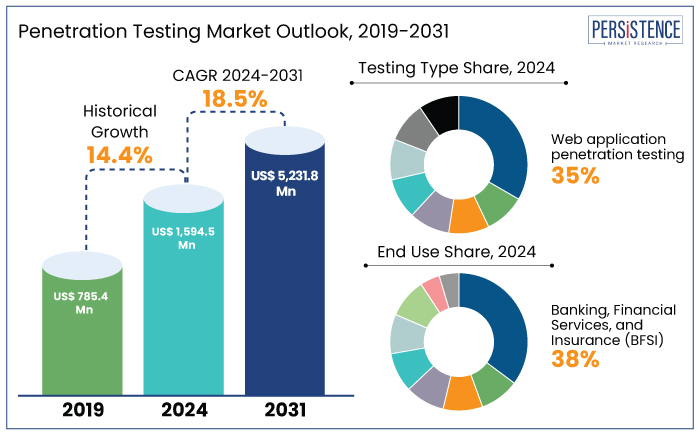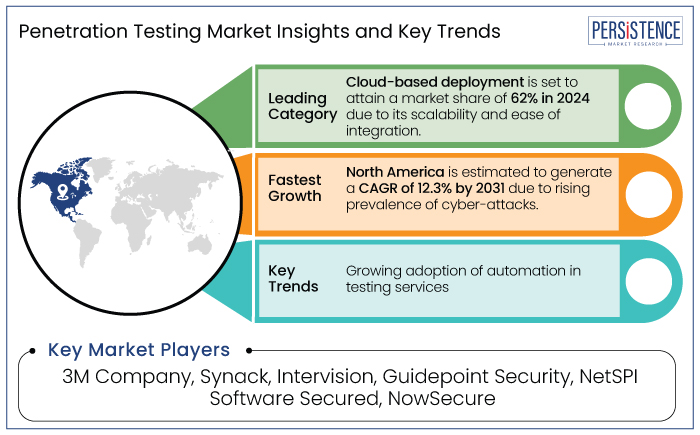Industry: IT and Telecommunication
Published Date: January-2025
Format: PPT*, PDF, EXCEL
Delivery Timelines: Contact Sales
Number of Pages: 188
Report ID: PMRREP35025
The global penetration testing as a service market is estimated to reach a size of US$ 1,594.5 Mn in 2024. It is predicted to rise at a CAGR of 18.5% through the assessment period to reach a value of US$ 5,231.8 Mn by 2031.
The demand for penetration testing is experiencing rapid growth, driven by the rising adoption of cloud computing, data centers, and evolving cybercrime tactics. The increasing complexity of cyberattacks, including ransomware and zero-day vulnerabilities, has heightened the demand for proactive security measures. For instance,
According to the studies, cybercrime damages will exceed US$ 8 Tn globally in 2024, emphasizing the urgency for robust defenses. Cloud-based solutions are growing due to their scalability and affordability, while AI and ML are transforming penetration testing by automating vulnerability identification and predictive analytics.
Asia Pacific is witnessing significant adoption, with governments enforcing strict regulations. These regulations include India’s Data Protection Act, of 2023, creating opportunities for penetration testing to protect sensitive information and ensure compliance.

Key Highlights of the Market
|
Market Attributes |
Key Insights |
|
Market Size (2024E) |
US$ 1,594.5 Mn |
|
Projected Market Value (2031F) |
US$ 5,231.8 Mn |
|
Global Market Growth Rate (CAGR 2024 to 2031) |
18.5% |
|
Historical Market Growth Rate (CAGR 2019 to 2023) |
14.4% |
In 2024, North America is expected to lead the penetration testing as a service market, accounting for 38.2% of the global market share. The region's leadership is driven by a sharp rise in cyberattacks and an increased focus on developing advanced security solutions. For example,
Government initiatives and regulatory frameworks, such as CISA's cybersecurity directives and HIPAA and PCI-DSS compliance mandates, are driving demand for penetration testing solutions in industries like healthcare, BFSI, and retail. Significant investments in research and development by IBM and Microsoft are enhancing efficiency and scalability.
North America's advanced IT infrastructure and cloud-based solutions drive growth, positioning it as a global leader in cybersecurity, with a projected CAGR of 12.3% in the forecast period.
Asia Pacific is projected to experience substantial growth in the penetration testing as a service market, driven by the increasing adoption of data analytics, software testing, and cybersecurity initiatives. In 2024, the region is projected to account for 27.4% of the market share. The regional market growth is fueled by the rapid digital transformation in countries like China, India, and Japan, coupled with increased cloud adoption and stringent data protection regulations. For example,
The increasing use of IoT devices and mobile applications, coupled with China's Cybersecurity Law Amendments, has made Asia Pacific a crucial market for penetration testing solutions.
In 2024, web application penetration testing is poised to dominate the penetration testing as a service market capturing a 35% of market share. The surge in web-based attacks highlights the growing importance of securing web applications. According to a report by OWASP, regular testing is necessary since 70% of online apps contain security flaws. Cyber threats like SQL injection, XSS, and data breaches pose a threat to companies that handle sensitive data.
The rise in sophisticated attacks has prompted organizations to adopt advanced penetration testing services to proactively identify and mitigate vulnerabilities. According to a 2024 survey, 60% of businesses want to increase their investment on web application security, underscoring the rising significance of strong defense against changing online threats.
The global penetration testing as a service market is transitioning toward cloud installations due to its scalability, adaptability, and cost-effectiveness. In 2024, cloud deployment segment dominated 62% of the market share, driven by the migration of critical operations and data, requiring robust security measures to protect sensitive information.
Organizations are prioritizing investments in cloud security solutions, focusing on AI-driven capabilities and enhancing cybersecurity for industries like financial services. Cloud penetration testing solutions that are based on AI and machine learning are improving security in contemporary IT infrastructures by fixing flaws.
The necessity for thorough security validation, regulatory challenges, and growing cyber threats are all contributing to the rapid expansion of the penetration testing as a service market around the globe.
The growing frequency and complexity of cyberattacks, including ransomware and supply chain breaches, necessitate the need of regular penetration testing. Regulations like GDPR, HIPAA, and PCI-DSS require sensitive data businesses to do ongoing security assessments. Consequently, they have prompted using DevSecOps techniques that emphasize automated, integrated testing solutions.

The global penetration testing as a service market recorded a CAGR of 14.4% in the historical period from 2019 to 2023. The lack of security analysts who can do penetration testing, which is essential for dealing with changing cybersecurity threats is posing a serious problem for organizations in the observed period.
Even while companies employ people to recognize and evaluate cyber threats, many also need to learn how to successfully stop assaults. Penetration testing is expensive, and if done incorrectly, it can result in losses.
Improved training programs are required to solve this and provide security personnel with the requisite knowledge. Demand for ethical hacking services is estimated to record a considerable CAGR of 18.5% during the forecast period between 2024 and 2031.
Demand for Security Assessments Boost the Smart Protection
As cyber threats get increasingly complex, penetration testing, also known as ethical hacking, is essential to find and fix weaknesses in IT systems. The necessity for cloud-specific penetration testing solutions has increased as organizations move to hybrid and multi-cloud settings, as seen by the 23% global rise in 2023 usage of cloud services.
Penetration testing techniques have been greatly enhanced by automation and AI, which allows for continuous testing and speedier vulnerability discovery. AI-driven solutions can currently identify 92% of threats in real-time. Application-specific services for online and mobile platforms are becoming in demand. in 2023, penetration testing demand is expected to climb by 18% due to the growing use of mobile applications in banking and e-commerce.
Trend of Modernization in DevSecOps Practices Opt for Automation in Security
The integration of security measures into software development lifecycles, which assures early vulnerability discovery and remediation, is transforming enterprise security testing through DevSecOps techniques.
For smooth incorporation into CI/CD pipelines, automated security testing techniques like dynamic application security testing (DAST) and static application security testing (SAST) are essential. Accuracy has increased dramatically and testing time has decreased by up to 40% due to recent developments in testing tools and platform-neutral solutions.
Companies like Microsoft and GitLab introduced DevSecOps solutions in Q3 2023, focusing on real-time threat detection, reflecting the growing need for proactive security in complex IT environments.
Communication Gaps in Testing Requirements and Data Inconsistencies
The development of thorough test cases is hampered by miscommunications in software testing requirements, misunderstandings, and variations in time zones and working hours, which impacted the organizational advancement and software quality. Inefficiencies are also caused by duplicate storage and inconsistent data.
Businesses are addressing this by investing in AI-driven testing solutions, such as TestOps platforms, which assures data integrity and facilitate collaboration.
Protection of Financial Data in BFSI Sector Opens Prospects for Improvements
The BFSI segment's substantial handling of sensitive financial and personal data contributed to their 38% market share in the global penetration testing as a service market in 2024. In the U.S., the notable expansion of cloud-based UPIs has raised the possibility of hacks and data breaches.
The BFSI sector is addressing security risks in online transactions by investing significantly in penetration testing services to protect their cloud infrastructure and transaction systems from potential vulnerabilities. Also, the rise of regulatory frameworks like GDPR and PCI DSS is escalating the need for regular security assessments and increasing the demand for penetration testing solutions in the BFSI sector.
Rise in Automation for Penetration Testing Propels Investment
The complexity of regulatory frameworks and the sophistication of cyber threats have increased the demand for automation in penetration testing. Automation improves security assessments by enabling scalable, effective, and continuous testing procedures. It is an essential tool for businesses seeking to satisfy strict compliance standards.
Automated solutions such as Qualys WAS and Rapid7's InsightAppSec offer real-time insights and repair suggestions, improving proactive threat mitigation by lowering reliance on manual testing. According to a 2023 survey, 70% of businesses are using automated solutions to close the skills gap in cybersecurity and guarantee strong security protocols.
Companies that offer penetration testing services are expanding their offerings and putting growth tactics including product launches, mergers, partnerships, and collaborations into practice. They can strengthen their competitive positioning, and deal with the industry's fragmentation by following these market strategies.
By launching cutting-edge solutions, they want to attract a wide clientele and provide an all-encompassing defense against new online dangers.
Recent Industry Developments
|
Attributes |
Details |
|
Forecast Period |
2024 to 2031 |
|
Historical Data Available for |
2019 to 2023 |
|
Market Analysis |
US$ Billion for Value |
|
Key Regions Covered |
|
|
Key Market Segments Covered |
|
|
Key Companies Profiled in the Report |
|
|
Report Coverage |
|
|
Customization and Pricing |
Available upon request |
By Testing Types
By Deployment Mode
By Industry Vertical
By Region
To know more about delivery timeline for this report Contact Sales

The market size is set to reach US$ 5,231.8 Mn by 2031.
Most companies perform 1 to 2 annual certified penetration tests due to high costs, vendor selection, vendor setup, and internal access configuration.
In 2024, North America is set to attain a market share of 38.2%.
In 2024, the market is estimated to be valued at US$ 1,594.5 Mn.
A few of the leading players in the market are 3M Company, Synack, Intervision, Guidepoint Security, and NetSPI.